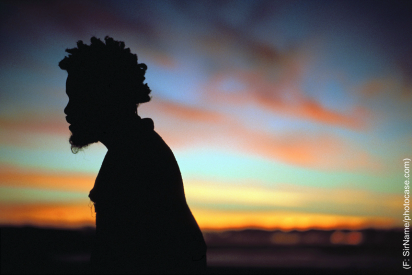Among men - The Essen pilot project "black + male"

As in most African countries, HIV is a big taboo in the African communities in Germany. Men in particular find this difficult. The "black + male" pilot project in Essen is therefore trying its very own approach to prevention. By Axel Schock
HIV is purely a women's issue." As far removed from the reality of life as this assessment may be, it is firmly entrenched in the minds of many African men. If women carry the virus and spread it, then the blame and responsibility lie solely with them. This view does not exactly make it easy for HIV preventionists like Pierre Kembo Mayamba. Over the past few years, the social counselor at Essen AIDS-Hilfe has repeatedly encountered men from Africa who had ignored the risk of infection and at some point were confronted with a positive test result.
"Many African men think they are invulnerable"
"Many Africans know how to enjoy life. They like to party and have an active sex life, even with several partners. Because they are usually very physically robust and well-built, they think they are invulnerable," says Mayamba. Many therefore only find out about their HIV infection at a very late stage, when the first severe symptoms of the disease have already appeared. But how do you reach these men to inform them about the risks of infection and how to protect themselves? And also to make them understand that HIV not only affects African women, but also them as men?
Talking to men at soccer tournaments
Pierre Kembo Mayamba has therefore developed "black + male", a unique European project for Essen AIDS-Hilfe, with which he can bring health issues to men in the best sense of the word. For the past three years, the Zaire-born preventionist has been on the road in the African community in and around Essen. Around 4,000 people with African roots live in this region. Because African men would never find their way to an HIV counseling center or even an AIDS service center on their own, Mayamba creates leisure opportunities to talk to them: for example, at culturally specific programs for men or at soccer tournaments. Mayamba also works with the operators of discotheques, which are particularly frequented by African men. On such occasions, he and his team listen to concerns of all kinds. Whether it's problems with housing, the immigration authorities or the job center, they offer advice and try to help.
"I didn't think it would work out so well at first"
"The men realize that we are there for them and gain their trust. And then, at some point, the opportunity to talk about everything else arises almost automatically: about their lifestyle and possible health risks, about the HIV test and about precautionary measures." The effort and the long build-up phase have paid off.
After barely three years, the project, which is financially supported by the German AIDS Foundation, has successfully established itself as a low-threshold counseling service. "At the beginning, I didn't think it would work out so well and that people would open up so much," reports Mayamba. As the name "black + male" clearly indicates, the service is aimed at all black men, regardless of their sexual preferences. This is not an insignificant detail. "The fact that a man can have sex with another man simply doesn't exist in our cultural understanding," says Clement Matweta, organizer of the Caritas HIV counselling project "African Rainbow" in Essen.
"Of course there are also gay men among Africans, but they are ashamed and hide. As a result, they are also difficult to reach for prevention." The "black + male" project is therefore one of the few ways to reach these men without them feeling exposed as gay or bisexual.
And perhaps one day they will be so strong and stable that they can openly admit their homosexuality. Mayamba is optimistic for good reason. "We recently experienced it in our working group for networking HIV projects in the African community: one of the network members had the courage to come out to us as gay. That was a great and wonderful surprise for all of us. He is of course an exception, but we need exceptional people like him to inspire and motivate others."
